#watercolour lesson
Text
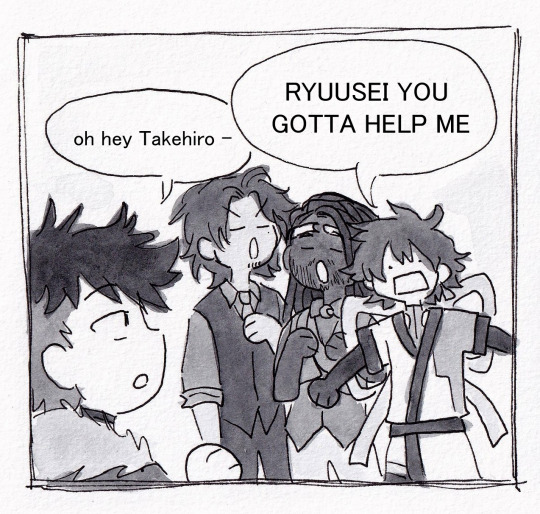
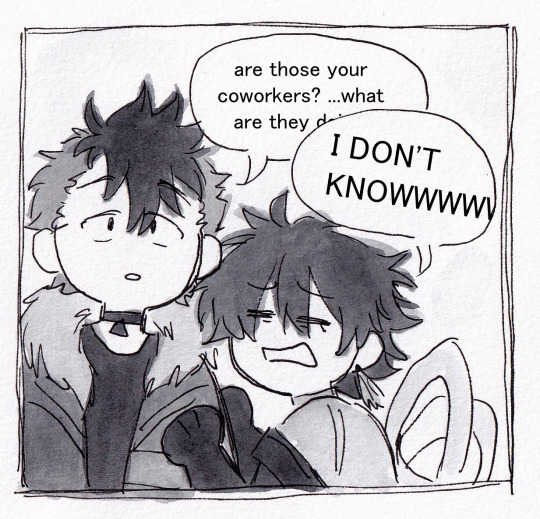
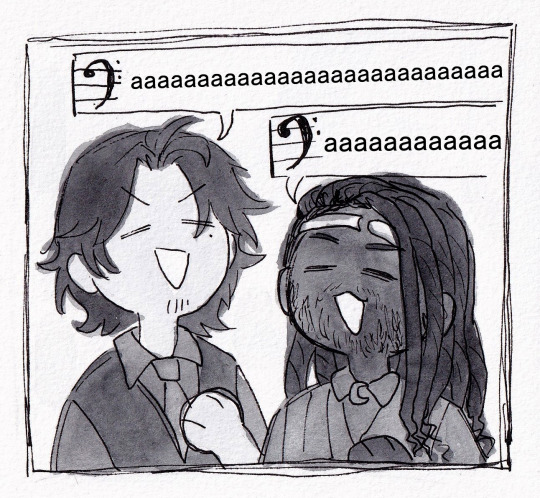
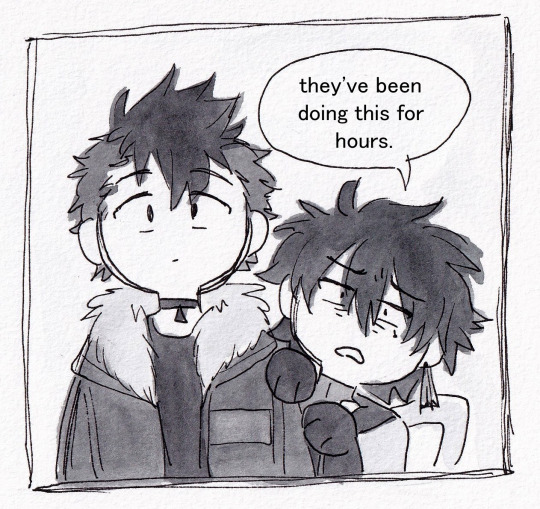
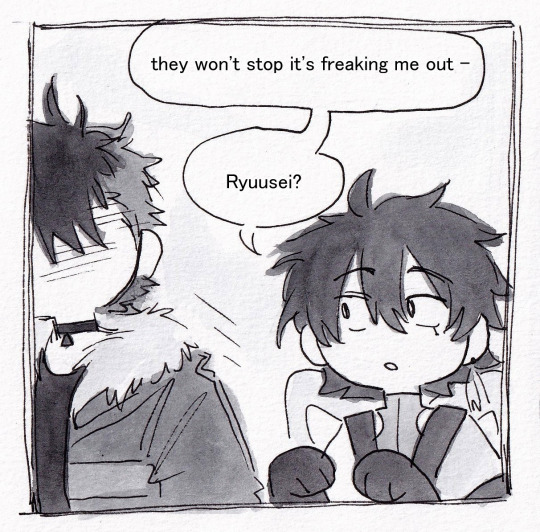
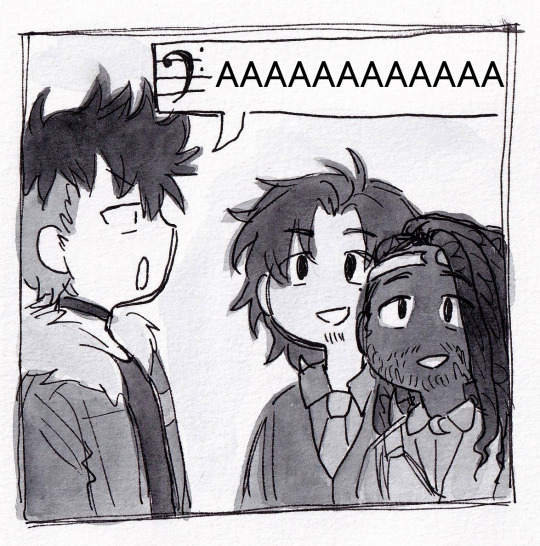
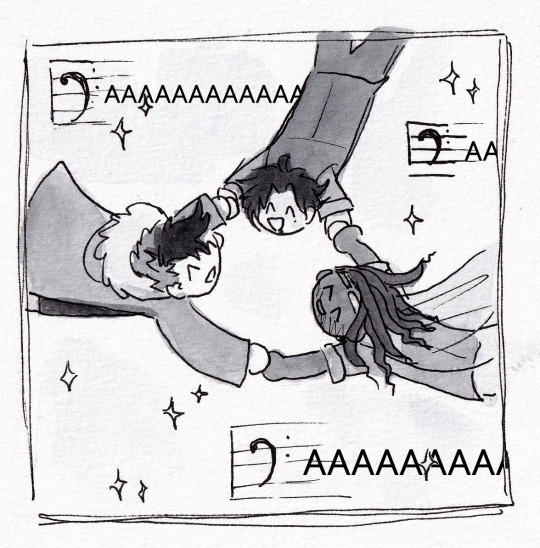
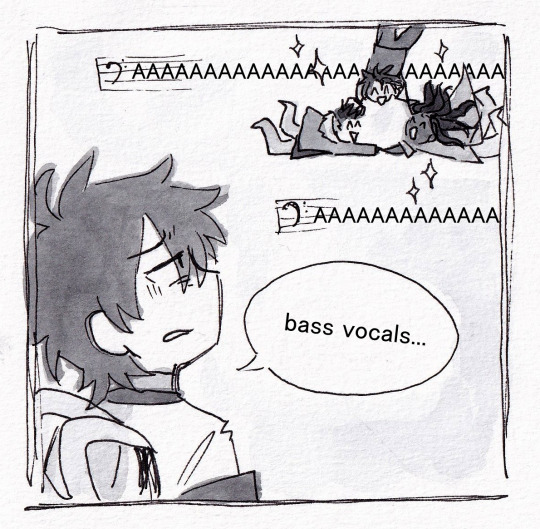
the rituals
#art#traditional art#watercolour#fanart#synthesizer v#synthv#voicevox#aoyama ryuusei#kurono takehiro#genbu#genbu gets both of his names tagged this time#frimomen#asterian#virvox project#distantly inspired by that one cutbu comic. the one with the alphabet. you know it#it was hard to figure out a way to portray three guys singing a single long low note#i hope using all the powers of my middle school piano lessons to draw a bass clef helped
82 notes
·
View notes
Text
i want to do some scenery sketches based on the 101 dalmations style.. maybe i will take my sketchbook outside at some point and do that
#not tomorrow though i have to take a day off drawing because ive done too much in the last few days#lmao#im really scared of watercolours though... thats my problem and i dont really have any others to try with#and doing it in a public place.... scary#im used to drawing in public usually its just americans who stop me but doing a median im not used to 0_o#my sibling taught the mayor valuable life lessons last week about watercolours and im not kidding
4 notes
·
View notes
Text

“Take this and call me in about three days sweetie” 😉😉😉
#mushrooms#magic#nature#trip#trippy#magic mushies#fairy folk#witchcraft#witches#witchcore#shaman#autumn#fall vibes#viking#celtic mythology#celtic gods#death and rebirth#lifestyle#life#life lessons#natural medicine#medicine#cute art#original art#art critique#artwork#my artwork#watercolor#watercolour art#pen and ink
0 notes
Text


Going through my stuff in my parents' attic. Hey, remember when I agreed to go to an art class and then got pissed off when the teacher was like "so vague shapes are your style?" IDK, man, maybe offer some tips on getting texture?
The boat does look good though

1 note
·
View note
Video
youtube
How to Draw a Mushroom: A Pencil Drawing Class For Beginners #drawingtu...
#drawinglesson drawingforbeginners drawingtechniques artforbeginners drawingstilllife#Join Art Class with Zoe on Youtube for more drawing and watercolour lessons#demo's and art book flip throughs
0 notes
Text
my kids are playing with dolls rather than dinosaurs for once
the 5yo: playmobile Aurora is plotting together with an evil witch and evil fairy godmother to create more enchanted roses to overcome Aurora's enemies
the 3yo: is making a fashion barbie and a mermaid barbie kiss because they like each other and is planning their wedding. the mermaid's name is Bluehair and the fashion barbie is changing her name to King
#my kids#Love them so much#In other news#Did YOU know if you don't let your watercolours dry before closing them they can get MOLD?!#Guess what science lesson we learned today 🤦♀️
0 notes
Text

В театральной сфере многозадачность - это нормально. Художник в театре это тот, кто умеет многое и может работать почти за всех в производственных цехах. Но есть ещё вещи не зависящие непосредственно от тебя. И вчера у тебя был отличный план и всё должно было сработать, а сегодня от него осталось только чувство паники. Можно, конечно, предположить, что нужно было сильнее давить на людей или застелить всё вокруг ещё более толстым слоем соломы...
Но честное слово, я НЕ понимаю, почему я ощущаю стыд за то, что груз практически невозможно доставить из СПб в Екб за сутки, а человека можно. За то, что кто-то отказался взять ткань на костюмы с собой в самолёт и из-за этого мы впустую прождали неделю, которая бы нам нынче по срокам очень помогла. За то, что Корея больше не производит нужную ткань, а костюмы шить надо.. Из-за всех этих и множества других микропричин, которые я не в состоянии контролировать, мы кинем в артистов костюмами за пару дней до премьеры. Это скажем прямо подстава, и мы старались, и мы не специально, и много чего ещё, но легче артистам от этого не станет.
Наверное это предполагалось само собой, что я немного обосрусь на первом большом заказе, а может не повезло. Тем не менее, я ответственно заявляю, что отказываюсь испытывать стыд за то, в чем нет моей вины! Какого художника вообще!?
Да и обосраться - это обычно, не нормально, но обычно. Неприятно и очень некомфортно, особенно для того, кто всё привык делать лучше , чем в среднем большинство. Зато можно извлечь урок и сделать выводы.
Моё нынешнее место работы вообще кладезь уроков🤦♀️
#new start#psychology#my thougts#theatre#new lesson#contemporaryartist#theater artist#psychological#stage design#costume design#workmywork#artists on tumblr#thoughts on tumblr#watercolorsontumblr#watercolour sketch
1 note
·
View note
Text

Sev & Minnie. Watercolour.
Tea break and catch up between lessons, I -love- the idea of these two being friends. ♡ I want to listen in on their conversations.
#professor snape#severus snape#snape fanart#harry potter#severus art#illustration#pro snape#minerva mcgonagall
1K notes
·
View notes
Text
Idk if its smth I've mentioned before but my nans a watercolour artist and today she tried to give me a lesson on different coloured lighting and painting without a sketch and whatever :)
Not completely sure I did what she wanted well but I DO now have a painting of the island of lost dakotas
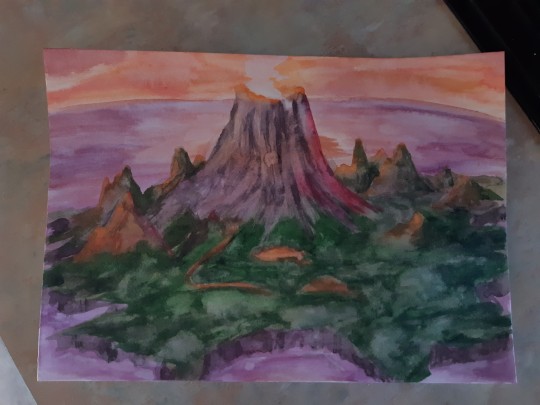
#ignore the fact that i dropped water right in the middle lmao#also emphasising the fact i did this with no sketch#like im PROUD#milo murphys law#mml#island of lost dakotas#fanart#painting#watercolour
69 notes
·
View notes
Text
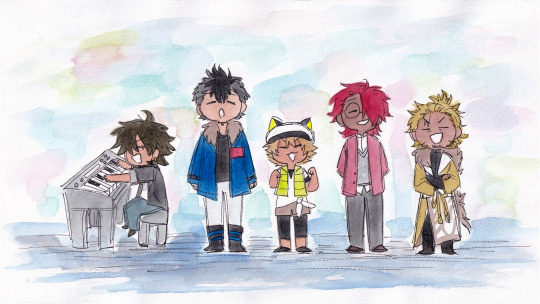
and of course here's the drawing from my recent voicevox cover~
#art#traditional art#watercolour#fanart#voicevox#oh god i need to tag them all again hold on#kurono takehiro#aoyama ryuusei#shirakami kotarou#wakamatsu akashi#kigashima sourin#virvox project#i spent a really long time fearing making a drawing for the video because i was like#i need to make takehiro play a piano. but i dont want. to draw a piano#and i was like. oh god. how am i ever gonna draw a grand piano. or even an upright. theyre gonna kill me#but then i remembered i took piano lessons as a kid on a synth keyboard (which my piano teachers HATED because i would like)#(turn down the volume to be lower while practicing because it was too loud for my brain)#(and i couldnt handle playing loud on their real pianos LOL and other reasons too probably)#so i was like. okay we're drawing the yamaha. we're drawing the yamaha#it had a few demo songs to show off the different synth sounds on it and i really liked the one that was like. a midi of scarborough fair#i also liked doing a weird thing where i would hold a key on the rain sound and switch to the thunder sound while still holding it down#and make a thunder storm :) i was really bad at piano lessons. can you tell
5 notes
·
View notes
Text

fearful, wonderful | scaramouche

general tags. kabukimono!scaramouche, trans!scaramouche, yokai!reader, gender-neutral reader, slowburn, yokai lore/imagery, very slowburn, food consumption/eating, tatarasuna.
content warnings. gender dysphoria, allusions to war and death.
word count. 5k
notes. this is an 18+ blog. minors and ageless accounts do not interact, you will be blocked.
synopsis. the puppet learns the horrors of the body.
masterlist | prev | next | ao3

III. SHED YOUR KNUCKLE VELVET, TORN ON MY TEETH.

Winter aches by.
The puppet had come to you in the middle of it, and now even as you watched, bunches of green leaves had begun to sprout upon the skeletal limbs of the trees. Exactly as predicted, the pathway up to the Hisehide’s house iced over, and those hacked-up cornstalks along with it. The puppet eyed them as warily as one might drawn blades, and insisted on holding your sleeve when you passed them.
As the days and then weeks unroll before you, the ground becomes crunchy with ghostly frost, and you’re able to see your breath in wisps as it escapes your mouth. A thick sheet of ice sweeps over the lake near your house and remains there staunchly for weeks, glittering whitely in the smudgy watercolour sun. The sky overhead is blanketed in dense clouds, dove-grey and swollen-looking, prone to pouring rain, sleet or snow as they saw fit.
Winter aches by, and the puppet gets a name.
It’s not you who gives it to him—that still feels wrong, feels grimy. Feels parental. And it becomes increasingly clear as the weeks pass that whatever you are to the puppet, it is not a parent. You’re scarcely even a mentor. You’re the owner of the house he sleeps him, the one who collects him from his tutoring lessons. The one who still hasn’t told him about the gold feather in your cupboard, or the Electro mark on his nape. You’re not even sure why.
Kabukimono. Strange things. The name that had stuck to the puppet as the townspeople slowly accustomed to his presence. Nobody knew the extent of what he was, nobody but you and Niwa and Katsuragi (though you suspected Honoka knew, too, with the way she never quite seemed to leave her children alone in either of your presence). They did not know he was inhuman, but they seemed to sense it on him. That particular feeling you are accustomed to.
There is a bird that frequents the lavender melon tree outside of your door. A blackbird, sweet and silent. Kabukimono becomes fascinated with her. He leaves dried fruits and cracked chestnuts outside on the frozen earth to peck at, and when he sees that she’s poking at his offerings he scampers to the window to watch. Over the course of around a week, he gains her trust.
One day you walk outside to find the blackbird perched on his finger. His expression is soft and open with wonder, as though awe had pulled him apart from the inside. His eyes round as pennies, lips parted. One of the porch steps creaked under your foot, and the blackbird twitched and took wing.
Still. One of the children nearby you owned a cat. It was never going to end well. But you wish you would have warned him.
You were woken early one morning by a scream. Any fatigue left you with a jolt, and when you peered around the room and realised Kabukimono was gone, your stomach lurched. You barely paused to pull on your hanten before rushing outside, barefoot against the frosty soil, looking around wildly. The cold air stung at your skin, the dawn mist curling at your ankles as you rushed around the house.
You came upon him in a heap. A soft shaking pile of cotton nightwear, his fingers digging into his hair and pulling at the roots. You approached, aghast at the honest fear you felt as you knelt before him.
“Hey. What is it, what’s wrong?”
You almost asked, are you hurt? But maybe his answer still would have been yes, because you think—you think this sort of thing really did hurt him. Splintered his ribcage apart and twisted up his insides. When he looked up at you, his expression was agonised, dark eyes shot red and spilling over with tears.
Your eyes trailed down to the tiny dark corpse at his feet. Wings splayed apart. Blood matted those dark feathers.
“Oh.”
“C-Can you… fix it?” He asked it with a sliver of earnestness, was the worst part. As though a part of him truly believed you would say yes. You wanted to, in that moment.
“I’m… it’s dead.”
His expression screwed up, contorted. “But I don’t want it to be dead.”
Your mouth opened and closed wordlessly. You wanted either to scream or to laugh. If only it were that simple!
But you did neither of these things, and your lack of response only seemed to frustrate the puppet further. “I don’t want it to be dead,” he repeated, his voice rising, cracking horribly. “It shouldn’t be dead! It’s not right!” He clambered furiously to his feet, and when you tried to follow him he flinched backwards. “Fix it!”
“I can’t.” You look at him in disbelief. “It’s dead. Understand? Nothing in this entire world can bring it back, certainly not me. Look, just—”
He cringed back, holding the poor dead bird in his pale shaking hands. “N-no!”
“Listen to me. Listen.” You stormed up to him and grabbed a handful of his shirt. “Things die. That’s the way it works. The things around you die and you live on. You can’t break down and weep every time it happens.”
“It’s not fair!” Kabukimono screamed, hands trembling so badly that he dropped the bird anyway. “Why did she have to die? Why did she have to leave me?”
You open your mouth furiously to answer and find that you do not have one. The puppet stares you down, eyes hard and furious and glimmering with tears, his pale cheeks flushed with fury, his mouth open and wet. Your eyes trail down to his hands; there is blood on them.
“Come back inside. It’s cold,” you say, even though he cannot feel it. He opens his mouth as though to protest, but there must be something in your expression that screams that you aren’t in the mood to be argued with. Instead he wilts. Deflates from the shoulders down and hangs his head and he shuffles past you to the door.
You look down at the bird, and find with an obscure sense of unease that you cannot conjure up even a smidge of sadness. The dark-feathered corpse on the floor may as well be an ink stain for all the empathy you feel.
Still, something compels you to pick it up. You bring it into the house, place it in a box. Kabukimono, still crying, watches you as you move around.
“What are you doing?” he finally asks, his voice hoarse.
You don’t answer, digging in your cupboard. You come up with a couple of incense sticks and a match, set them alight in a cup to catch the ash. Funeral rituals. It’s been so long you barely remember the steps. With humans, you’re supposed to water the lips and wash the body, but this will do for now—it’s a more extravagant burial than any vermin killed by a cat could hope for.
“We’ll bury it later,” you tell Kabukimono.
There is blood all down your front.
“I’m going for a bath.”
It’s unnecessary—most of the gore had stained your nightclothes, and there was only a little on your hands and arms. But you feel dirty. It’s not that blood makes you squeamish, it just makes you wish you were dead.
You boil the water over the stove and pour it into the tin tub. You’re impatient enough to find that just over the halfway mark is good enough for you as you strip off your clothes and clamber in, sitting with your knees on to your chest and your back to the metal. You tip your head back against the tin lip, feeling obscene, feeling heavy, feeling incorrigible.
You don’t often like bathing. It thrusts the imperfections of your skin out in the open. Broken apart and sealed back together with gold at the seams like a shattered cup. Like seto. It reminds you that there is no soul holding you together, like most human bodies. Only paint and a prayer.
The door ekes open, and you scramble to cover yourself. “What?”
Kabukimono’s huge sorrowful eyes peer around the frame. “I need to wash my hands,” he says tremulously. You tuck your knees closer to your chest, hesitating. It shouldn’t bother you to let the puppet see your naked body. You don’t think of such things as humans did, anyway—as yōkai, your form had never been a vessel for pleasure or gentleness. All you’d known was breaking apart and being put back together. In any case, you don’t endure the shame or embarrassment most humans feel when unclothed.
But Kabukimono is different, and you’re not even sure why.
You’re being irrational, you tell yourself, and nod over to him awkwardly. “Just… dip them in the water there.”
He nods, shuffling in. You scrunch against the hot metal wall of the tub and watch him out of the corner of your eye. His cheeks are still faintly pink, his eyes red-rimmed and splotchy; when he dips his hands in the water, they tremble slightly, sending shuddering rings spiderwebbing out from them over the steaming surface.
One of his fingers bushes against your ankle, and you flinch back like you’ve been shot.
Kabukimono raises his eyes to you, and you hate how pinned you feel by them. It’s something in them that makes him difficult to look at, like trying to peer straight into the sun. Something good, something innocent that you’re going to ruin.
Katsuragi has made a huge mistake. You sit in the bloody bathwater and you’re sure of it.
You’re going to ruin him.
You’re going to make him just like you—
“Why are you hiding from me?”
Kabukimono’s voice is soft, inquisitive. It makes you want to grow brambles over your skin and hide. “What?”
He straightens up but stays kneeling on the floor beside the bath. The expression on his face is sort of… bewildered. And hurt. Your stomach lurches.
“You don’t offend me,” he tries, earnestly confused. “You told me before that my body wasn’t offensive, yet you still asked me to hide it. Because of… decency.”
You remember. The diamond cut of his white limbs in the stormlight, in the middle of your dark parlour room like a melting wax candle. But it’s true—yōkai have no shame. You are born naked and often live in it. You clothe yourself whilst you live among humans, but for their comfort, not yours. But Kabukimono is not human, and if shame exists in his soul it is you who taught it to him.
“I was… wrong to say that,” you whisper hoarsely. “There’s nothing indecent about your body.”
Kabukimono’s lashes flutter. They’re long, delicate wisps, framing those eyes, those eyes. Globe thistles shining out of the thin cage of his head.
“What about yours?” he asks breathlessly, every word clinging to his lower lip as it escapes him. You flinch again, because he doesn’t know, doesn’t know the half of it, the things this body has done.
You are shameful. You are indecent. But not for the reasons he thinks.
Kabukimono looks upset again. “Why would your body be indecent but not mine?” he presses, and your skin is starting to prickle. His eyes drop, trailing over the exposed skin, and you wish you’d filled the tub to the brim if only so it would provide somewhere to hide. Every crack in your flesh that has broken apart and been painted patiently back together, and it doesn’t sing so much as it screams.
“You wouldn’t understand,” you choke out.
“But—”
“That’s enough. Get out.” Kabukimono draws back, blinking at you. Stung. It only makes you sicker. “Get out, I said! I don’t want you in here, I don’t want you to look at me, I want you to leave!”
“I—I didn’t mean to—”
“Either get out of this room or get out of this house, understand?”
Kabukimono gapes, scrambling back like you’d struck him, and a soft, cut noise escapes him from somewhere high in his throat. He hightails out of the room, the sliding door rattling from the force with which he slams it shut. Your hands clench at nothing in the water, feeling too big for your body, your skin feeling delicate and bruised.
You stick your head under the water and scream.
It’s unclear how much longer you stay in the bath; you don’t want to step outside the safe confines of your tiny bathroom. Don’t want to face the puppet and his big reproachful eyes and trembling bottom lip. You don’t want to be reminded of how monstrous you are in the face of his innocence.
Still, by the time you make the move to lift yourself up out of the yawn of the bathtub, the water is bitingly cold. You dry off and dress methodically, stalling for as long as possible. You wonder, briefly, about curling up on the condensation-wet floor and sleeping there. Certainly, you’ve rested in worse conditions.
You’re being ridiculous. It’s your house.
And yet you creep through it like a stranger, like you’re the ghost in the walls, the trespasser. In so many ways you suppose you are. A spirit in a human house almost feels like a sick joke. You move quietly, bare feet padding over tatami mats, and you slide the bedroom door open like you’re trying to keep a secret.
The puppet is a bundle of bedsheets scrunched into the corner. You know he’s awake—both because he doesn’t sleep in general, and because of the way the bundle flinches when the door clicks shut—but he doesn’t say anything as you slip into the room. You feel like he had breath, he’d be holding it, and you suddenly feel desperately sorry and desperately disgusting.
You crawl into your own futon, searching for comfort in the sheets but finding only the starchy smell of clean linen. Instead, your eyes trace the patterns that the moonlight paints onto the wall, and you count your own heartbeats until sleep slips you under its dark veil.
You dream, because of course you do. You dream of a sunlit field dotted with white chrysanthemums. You lay among the grass as the sun casts a lazy arc overhead, and you are so young and so stupid and nothing bad has happened to you. Summer carries by on a warm breeze, and your friends’ laughter pollinates the air. You feel that you could drown here. You feel that you could just die—
A soft weight creeps over you. You groan, tuck your head back against the flesh of the mattress, about to slip back into your halcyon dream, and—
“I thought you wouldn’t come back.”
You snap out of sleep like you’ve been slapped, all traces of summer draining from you in a cold plunge. There’s frost on the windows, but you’re not necessarily cold, and in the dark a shadow moves over you.
Kabukimono hovers over you, knees on the side of the futon, face above yours. His weight is braced by one arm next to your head. You can just barely make out his outline as your eyes settle into the pitch-darkness; it feels like you’ve only been sleeping for an hour or so.
“Wh—what?”
The arm beside your head shakes. “I thought… you truly meant it when you told me to leave. I thought about it. Just going. But I remembered about the ice on the path and I got scared, I got scared. Don’t you see? I need you.”
Your throat tightens. “Kabukimono—”
“No,” he interrupts. “Don’t tell me I’m wrong, please, please. Don’t send me away. Please, I can’t—I can’t—”
“Okay, okay. Hey.” You fumble in the dark, still half-delirious but sobering to reality as the seconds ooze past. You sit up, carefully dislodging him. “Don’t be upset. I’m—I shouldn’t have yelled.”
“You tried to make me leave,” he bursts out, his voice shaking, cracking horribly like broken glass. “Is that really what you want?”
Yes, you scream in your head. But not for the reasons you think.
“I’m not—suited,” you say haltingly. “To take care of you. I will make you into something miserable. As miserable as I am.”
You can just about make out the fuzzy outline of Kabukimono tilting his head. “Then why did you agree to take me in?”
“Because you’re not human.” The words rush out of you like vomit, and you feel the puppet go very, very still. “And nor am I. And I know how lonely that can be. To sit and watch the whole world go by with you unable to keep up. To love something not designed for you to love. And I—I’m too…”
The silence that swells between you is as heavy as concrete—at least until you feel him move. Hair brushes against your chest, right to the left of your breastbone. You stiffen, tense; achingly slowly, Kabukimono presses his cheek to your chest.
“What—” Your mouth dries, fills with saliva again at a rapid rate, and you swallow hard. “What are you doing?”
Kabukimono’s head twitches against you. And then he murmurs, “You have a heart. That’s more than me. I don’t think you’re doomed. Only I am.”
“You’re not doomed.”
“Everyone I love sends me away,” he whispers, voice catching, thick and wet. “I’m not meant to be kept. I’m not coveted or desired. I’m a burden.”
“Stop that. Stop it.”
“Even you don’t want me.”
“Stop it. It’s not that I don’t. I don’t want to mess you up.”
“You won’t. The only way you will is if you leave me. If you force me out.” His voice is thick with emotion. “Please, please…”
Your heart thuds treacherously in your ears. “Do you mean it?”
His body scrambles against yours, alight with sudden feverish hope. His head retracts from your chest, hovering excitedly in front of you. “Yes. Yes. I mean it. Just don’t send me away and I’ll be fine.”
It’s inconceivable. For someone to want to be wanted by you. But his voice is so tender, so weak, and you find you don’t have it in you to spurn him.
So you make the worst mistake of your life, and you tell him in hushed tones, “Alright. Alright. I won’t send you away.”
“Promise? Promise me.” His voice is like torn sandpaper, ragged and raw. As though if you say the wrong thing here and now he will be irrevocably ripped apart.
“I promise.”
That’s where it begins to unspool, you suppose now, even if you had no idea then. Kabukimono jams his head in the crook of your neck, trembling hard, and you can’t help but think you’ve made a mistake.
You have. But there’s no way you can know this, not yet.
For now, all you know is the puppet on top of you, bracketing your hips with his knees, and your shame rises until it chokes you back against the pillow.
Your incorrigibility pulses. Your indecency grows teeth.

So winter aches by.
The days roll into weeks, and the frost gradually dissipates. One morning you wake to find that the lake beside your house has thawed during the night, stretching out in an endless glittering grey ribbon away from you. The dry frostiness in the air leaches away, filtering in humidity and warmth.
The winter thaws, and so do you.
There’s a rustle in the village one morning. The sun ekes out, bathed golden instead of muted white for the first time since the winter began, and it’s as though the people of Tatarasuna rise with it. You peek out of your window to see the slow procession making its way around the eastern hillside.
“Where are they going?” Kabukimono asks, craning his neck. It’s a spill of people, old and young. You spot Niwa’s bright hair in the crowd, his sister and her children at his heels. He’s painstakingly pushing an elderly man in a wheelchair up the ornery pathway—his grandfather, you think, knowing of his presence but never seeing him for yourself. He’s frail and so, so old—about as old as you know humans are capable of getting. His skin is papery, clinging loosely to jutting bones.
You know at this age, his own body is failing him. His joints are all swollen with arthritis, and he’s so ill that he rarely leaves his room, let alone his house. Every jolt and jerk over that rocky path must be agony. And yet he smiles. He looks up at his family and he smiles, watching his great-grandkids rush along and play-wrestle each other. He reaches up with a shaky hand and pats the one Niwa has on the handlebars of his chair, his thin lips stretching into a weak grin. Niwa laughs, turns to Honoka, and she laughs too.
Aging is one thing you have never coveted the humans for. And even then, it seems they are coping with it better than you.
“It’s hanami,” you answer after a distracted moment. “They’re going to watch the sakura bloom, to celebrate the beginning of spring.”
“Can we go?” Kabukimono wheedles, lit up hopefully. You sigh, the No already on your lips. What is the use in marking another human year, when they seem to go by as often as seconds to you some days? But you catch the puppet’s eyes, and something inside you lurches painfully, like the string of a bow snapping and loosing a bolt into your heart. This is his first year outside of that Pavilion, that endless brambly dark labyrinth sparing him never a glimpse of the outside.
Who are you to isolate him as you isolate yourself? If he wants to assimilate with the humans, if he wants to observe their traditions and find a home in them, who are you to stop him? For a moment a siren sounds in your head, a flashing warning baring Ruin! Ruin!
…But. The only way you’ll mess me up is if you make me leave.
“Fine,” you find yourself saying. “I… let me get dressed.”
Kabukimono’s eyes light up, and the vision stays with you as you return to the bedroom and pick out a cotton yukata, plain and unassuming. Putting it on feels methodical, draping it over your limbs, trying the rope knot at your middle. You think for a moment—and then you reach inside, hunting for another. This one is dark, with the hips cut wider and less intricate knots. You carry it out with you and press it into Kabukimono’s hands.
“It’s traditional for the humans to wear yukata for the flower viewing,” you tell him. “You should… put this on. It’s a man’s one, I think donated to me by a teenage boy in the village when he went off to apprentice as a blacksmith. It’s… yours, if you want it.”
Kabukimono turns the cotton fabric over in his hands as though it’s spun gold. “For me?” he whispers. “Truly?”
“Have it.” You’re not sure what compels you to say it, but you continue, “It’ll suit you.”
You barely have time to take in his reaction before he launches himself at you. You stumble back with the force of it, and it occurs to you that a regular person of his size could never hope to knock you off your feet. There is so much strength packed into his small, slender limbs. Finding remnants, tiny reminders of his infrahuman make up feels like reassurance, feels like a bite. He curls around you like a cat, burying his face in the crook of your neck; the fabric of the yukata crushes between your bodies as he digs his fingers into your back, a little too hard.
“Thank you,” he whispers into your skin. “Thank you, thank you—”
“It’s alright,” you say awkwardly. Your arms dangle limply at your sides. “It’s nothing. Just—alright. Just go put it on, alright?”
He draws back, trembling, bright-eyed and so sickeningly human in his earnestness, in his gratefulness, that you feel more inhuman than ever. You grow outside of yourself, looking in, looking at the monster in the house. The warrior in the home. The bloodstain on the tatami mat.
And then Kabukimono brushes past you to the bedroom to change. You run your hands over your face like you’re trying to hold it together, and by the time he returns, pink-cheeked and bashful, you can almost breathe again.
“Did I put it on right?” he asks, holding out his arms.
You run your eyes over him. The yukata drapes over his form, just a shade too large, but these things are hardly desired to inflict anything but a linear shape anyway. The knot is wobbly, but secure. But—
“You’ve tied right over left.” You step towards him, hands going out to undo the knot around his middle; he follows your hands nervously, swallowing hard when they brush over his stomach. “You must wrap the left side of the fabric over the right. Right over left is how you dress humans who have died. It’s bad luck.”
You untuck the fabric, leaving it undone in a straight line down his middle. There is a line of white skin slashed against the black cotton like a door cracked open in the dark. You wrap carefully, the right side first and folding the left over it. Several times, your hand brushes against the plane of his stomach; it’s unsuspectingly warm, and it tenses when your knuckles glide over it. Finally, the band, resting just over the jut of his hipbones, and the thick rope that you tie in a neat knot.
“There,” you murmur, and Kabukimono gazes up at you, lips parted and eyes wide and starry. A red blush melts over the high apples of his cheeks, and you step back as hurriedly as if he’d burned you. “Come on. We’ll miss the procession.”
You slip on shoes and hurry out the door. The weather is still a little cool to where you resent the thinness of the cotton a little, but it’s so much milder than the bite of winter that you relish in it. The earth of the path next to the cornfield is damp and soft as you hurry over it, but Kabukimono grips your sleeve anyway.
The path trails lazily around the eastern hillside and into a valley that wriggles itself between two mountains. On either side of the valley grow copses of cherry blossom trees, arching overhead to create a dappled canopy, an archway flooded in pale pink and white and lilac. Even as you approach, stray petals drift down from the groves, catching in hair and lashes and snagging on spare threads. In the valley, a stream rushes past; Rie and Shinsuke, as well as a host of other kids, have kicked off their sandals and splash around, spraying each other or else picking up lone crustaceans unlucky enough to have wandered in.
Kabukimono’s grip on your sleeve tights to a vice as you slip under the canopy, his neck craned up so high he’s in real danger of spraining it.
“Y/n! I never thought I’d see you here!”
Katsuragi emerges from the crowds and slips towards you, a genial grin on his face. He looks tired, circles the colour of bruises arching beneath his eyes and his hair scraped back carelessly into a ponytail, but his smile makes five years melt off his face easily.
“Katsuragi,” you greet wanly as Kabukimono tenses excitedly. “I thought you’d be too busy to participate this year.”
“Ususually I would be,” he agrees solemnly. “My father is sick at the moment, though. I got the day off to care for him. Just a flu, should pass soon, especially now the weather is warming up. And I thought the spring air would do him some good, so I brought him over. He’s by the stream. But enough about me—how are you two doing?”
You shrug. “Kabukimono wanted to come and observe hanami,” you say in lieu of answering. Katsuragi grins.
“Is that right?” he asks. “How’re you liking it?”
“It’s beautiful,” Kabukimono whispers reverently. “Does this really happen every year?”
“Every spring,” Katsuragi confirms. “You should come every year. It’s always beautiful, and always nice to see after a long hard winter. Reminds you that life has a way of turning around even when it seems grounded in what it is. Right, Y/n?”
You look at him archly.
Why entrust him to me?
Who says I’m not entrusting you to him?
“The flowers are pretty,” you spit, annoyed all over again. Katsuragi’s smug grin doesn’t help.
“Indeed they are. Don’t let me stop you enjoying them,” he chuckles. He reaches out, ruffles Kabukimono’s hair. “Enjoying the new haircut, by the way. Suits you.”
Kabukimono glows, pink-cheeked and delighted as Katsuragi meanders back over to his father. Pest.
The two of you walk over to where you see Niwa. He greets you delightedly, and even Honoka offers a wan smile and a halfhearted wave. Rie and Shinsuke splash over to you, babbling about some sort of fish they’d found under a rock. Kabukimono talks emphatically to Niwa, first about his reading and writing, and then about metallurgy. You raise an eyebrow and both the men shift sheepishly.
“Kabukimono here was wondering about learning a little bladesmithing,” Niwa says. “What do you think?”
You shrug. “It’s… a valuable skill to have. If you don’t mind teaching him, I mean.”
“Not at all,” Niwa beams. “Rie and Shinsuke adore him, you know? Even Honoka has a soft spot. Soon enough he’ll be part of the family.”
He misses the way Kabukimono freezes as soon as that word leaves his mouth, misses the look of longing and disbelief that wrenches over his expression. You catch it, though, and then you wonder when you started paying so much attention to the puppet, to the ghost in your house, because you’re sure you know exactly how he feels and what he’s thinking.
Niwa and Honoka, Rie and Shinsuke—they can be a family for him. The kind he deserves. Empathetic and practical and good. You are not built for family. You are not built to be a home.
You are tsukumogami. That is all you will ever be.
#🫀.scribes#genshin x reader#genshin impact x reader#scaramouche x reader#scaramouche x you#wanderer x reader#wanderer oneshot#kabukimono x reaer#kabukimono oneshot#scaramouche x gender neutral reader#scaramouche x gn reader#genshin x gender neutral reader#genshin x gn reader
84 notes
·
View notes
Text
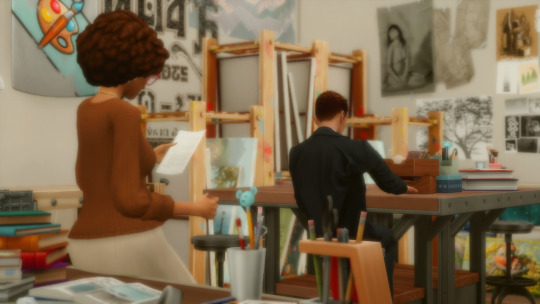
After art class on Wednesday morning I purposefully take longer than everybody else does to pack away my pencils and gather up the sheets of paper I was working from, slotting them meticulously inside the hard cover of my sketchbook so that the corners won’t get crushed inside the disorganised chaos of my school bag. Evan waits by the door tentatively waiting for me in case I might want to have lunch with him again, but I wave him away, I’ll talk to him after school, and when he’s gone it’s just me and the teacher, the last ones in the room.
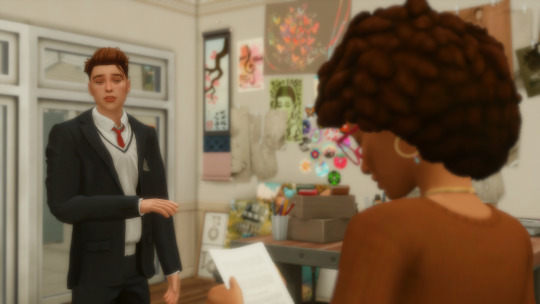
Miss O’Reilly is busy organising papers on her desk. She is separating the watercolour sheets from the cartridge and stacking them into neat little piles for the paper shelf, and doesn't seem to realise I am there until I address her.
“Miss?”
She glances up, “Yes?”
My fingers fidget with the zipper of my bag, pulling it open then closed again. The sound it makes is probably annoying but I can’t seem to stop myself. “Do you mind if I talk to you for a minute?”
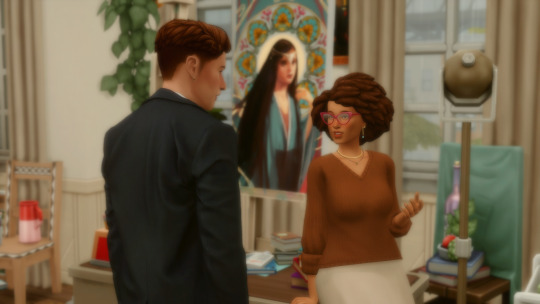
“Of course, what is it?”
I approach her desk with caution as I enter this unfamiliar territory, reaching out to a teacher, risking vulnerability, but Miss O’Reilly doesn’t seem to think it weird that I want to speak with her. She simply leans against the front of her desk with an open expression, smiling warmly at me as if I am not the student who routinely ignores what she is saying in class, talks over her and interrupts her lessons by throwing bits of eraser into Philip Delaney’s mad ginger frizz.
“I’ve been thinking about college, miss.”
“Well that’s good!”
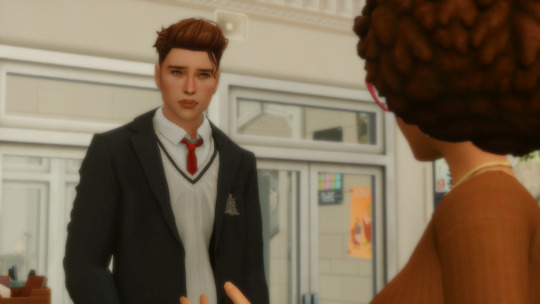
“Yeah, um, I think I want to… like, do… art?” I exhale in a rush. I don’t fully understand why I am so nervous to speak, especially when, so far, she’s being nice. She doesn’t even look like she’s going to laugh, like she’s thinking about doing it soon, or even like she's holding it in so that she can do it later in the staff room with the other teachers. Still I keep my guard up, waiting for her features to twist into a sneer.
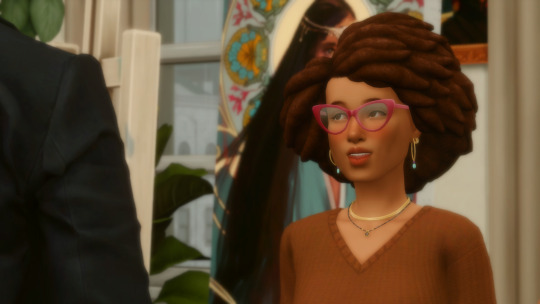
“I think that’s a fantastic idea,” Miss O’Reilly beams, and her eyes flick to that drawing I did of Michelle a couple of months ago and which she pinned up on the wall for everyone to see. She’s using it as an example to other students of the right things to do, the right way to capture a perfect likeness, and I should be flattered, but its presence embarrasses me. It is a symbol of my earnest effort, hard work, in which I am not known for, and I wish she would take it down and hide it. I don’t want others to know that I have tried.
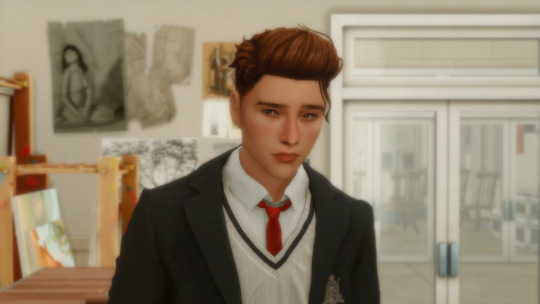
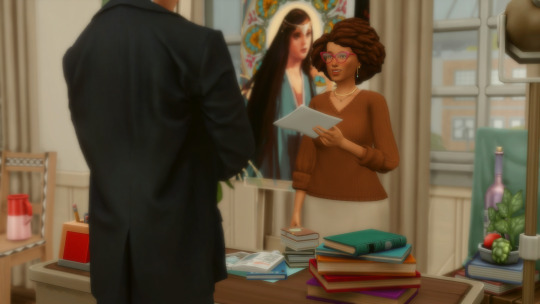
“Do you?”
“Yes! And I'm glad that you've said that, honestly. You’re one of the students in my classes who shows a lot of promise, and who I think could really do well in art school, and I know it’s not often a popular choice with parents, but I think there’s a lot of value in an art degree if you’re passionate about it,” She moves around to the front of her desk and begins rummaging in a drawer. “Here,” She produces a form and hands it to me, “These are the portfolio requirements for some colleges. It seems like a lot, but normally students take a year to do a portfolio course in a local college before applying to university.”
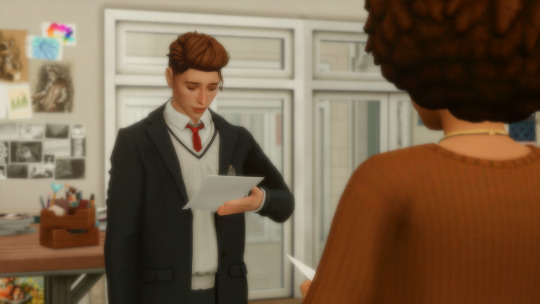
A year out? To just work on my portfolio? The thought of delaying my exit from Dublin for an extra twelve months makes me queasy, but my eyes flit over the paper in my hands anyway. It’s all about figure studies and expression, colour work, painting, charcoal, pencil…
“I don’t want to go to college in Dublin,” I manage, handing it back to her. “I want to move away. And I want to do my portfolio soon, so that I can do that as soon as I can.”
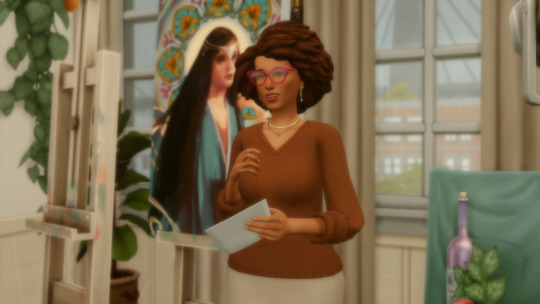
She eyes me curiously, “Alright… Well, there are heaps of options for international study...”
“Yeah, I think that’s what I want.”
“Do you study French?”
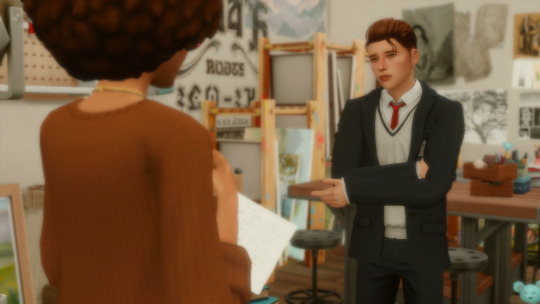
“No, German,” German, which I chose in first year because I am lazy and it seemed easy at first. The words were just like eccentric cousins of English ones that could all be squished together into hilariously long streams of letters that my friends and I would laugh about. Schwarzwälderkirschtorte. I’ll never forget that one, nor will I Krankenwagen, Backpfeifengesicht, Schadenfreude. All of us lazy boys who didn’t want to make the effort with French took German, whose words actually sounded the way they were written. I admire directness in people, so I expect it in languages too. French is underhanded, insincere. Why speak one that makes you work so hard? It’s absurd.
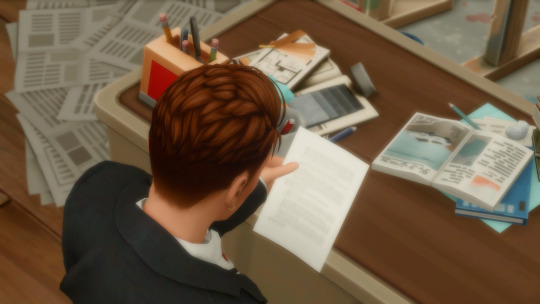
“Well,” Miss O’Reilly goes back to her drawer for more shuffling, “Have you considered studying in Germany? Or the UK? There are lots of great universities abroad.”
“I never thought very far ahead,” I admit, “I just know I don’t want to study here.”
“Okay, well, at least that narrows it down some. Have a look at some of these in your free time,” She slots a small stack of forms into my hand, to which I stare dumbly at. The barrage of information is a visual assault with all of these bullet points and new abbreviated words, application fees this, UCAS that…
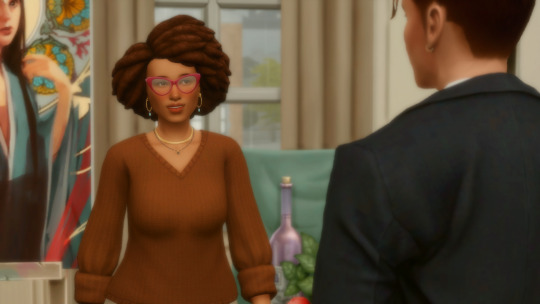
I must look stricken as I feel, because Miss O’Reilly softens, “or you could come back to me when I have a few moments free and we can go through it all together. I know it’s a lot to take in, and usually we don’t go so much into depth with fifth years. This kind of thing is for next year, and usually we try not to overwhelm kids with too many decisions too soon.”
“I know, I just think I’d like a head start. Especially if there’s all these, um, requirements.”
“Well, as I said, a portfolio preparation course at a local college-”
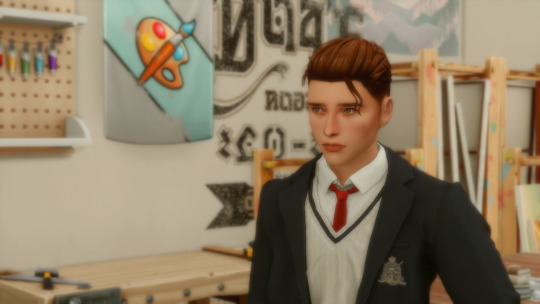
“I don’t want to do that.”
She blinks, “Right.”
“I really just want to go somewhere new, miss. I’m willing to work hard at every chance I get to do it, I’ll make art all summer, I’ll have the best portfolio ever-”
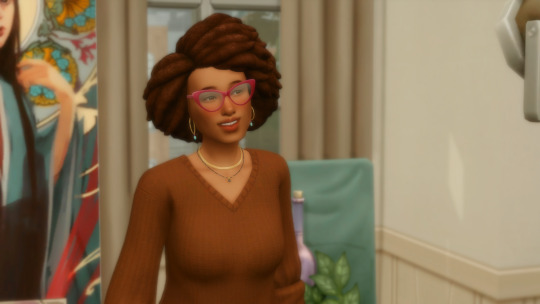
She laughs, “I’m sure you will! I don’t doubt you at all, Jude, you’re a wonderful artist and I’m willing to help you with your work whenever there’s time to.”
“Well I don’t do Irish,” I say, “I’m exempt, so I have a free class every day where I usually just try and do my homework…”
“Well come to my class then, even when I’m teaching other years, you can sit down at the back of my lessons and just do your own thing, get working on those figure studies, the paintings, whatever. As long as you don’t cause trouble…” she eyes me warily, “It’s not a problem.”
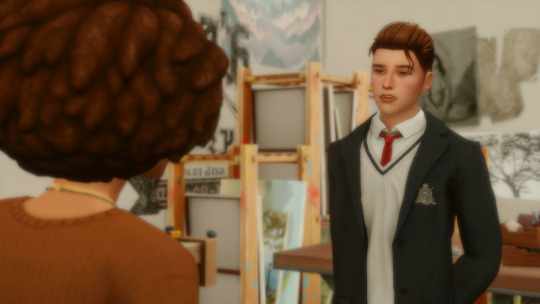
“Really?” I don’t mean to sound so overwhelmingly grateful to her, as though I’m on the brink of falling to my knees and worshipping her, but truly, I am in slight disbelief at her offer. Most of my interactions with the teachers in this school have been of them snapping fingers in my face, rolling their eyes, calling me out of class so that they can berate me loudly in the hallway while my gleeful classmates crowd around listening at the glass panel in the doorway. It’s almost hard to believe that I have found one who is intent on being supportive.
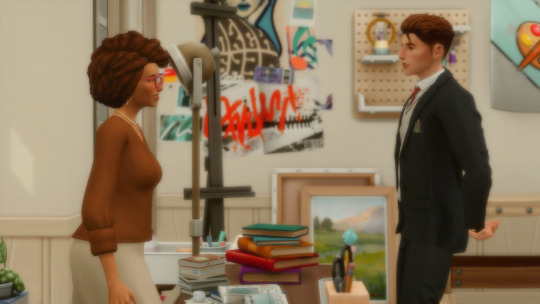
“Yeah,” she says, and she’s distracted by the crowd of third years piling into the room behind me. “Come by any time between classes, I’m happy to help.”
“Thanks, miss.”
“No problem at all,” she turns to the hoard, “hello everyone! Art history today!” and they let out a collective groan as I slip out into the hallway.
Beginning // Prev // Next
#lucky boy 2009#potentially boring school stuff#but interesting if you've read lucky girl and you know what he ends up choosing idkkk#love Miss O'Reilly she's such a gem#finally a teacher that humanises him lmao
51 notes
·
View notes
Text
something i was told about painting with watercolour is that what you don't paint is just as important as what you do paint. recently i realized this is the same lesson i was given in poetry class, where we shaved off every redundant word. negative space huh
47 notes
·
View notes
Text

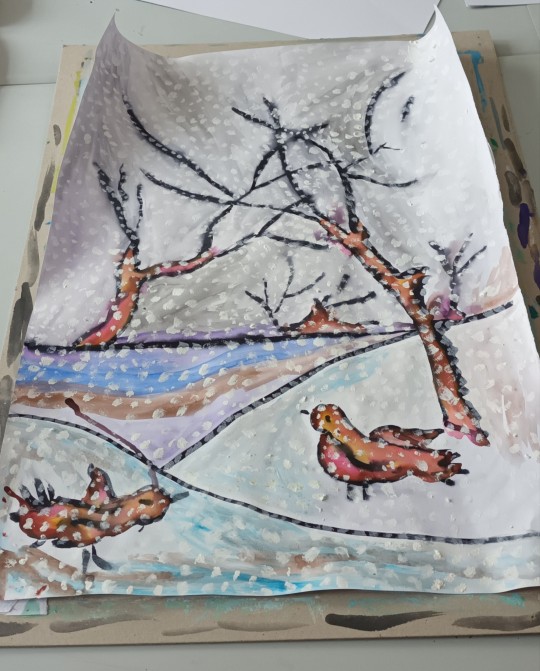
My another watercolour art from my art lessons tutoring
And also my watercolour studying, the theme was The Winter
#lithuanian artist#baltic artist#european artist#beginner artist#wannabe artist#small artist#small art account#traditional artist#watercolour artist#artist on tumblr#nature artist#artist#my art#watercolour art#watercolor
48 notes
·
View notes
Text
Day 1 – Maedhros – Coping
For @feanorianweek
You can also read it on AO3
Maedhros used to think he didn’t have a traditional Noldorin craft. That his craft was the same as his grandfather Finwë’s, excelling in diplomacy, politics, being a skilled orator and an attentive listener, a natural leader among brothers, cousins and his people. That his talents ended there and no further.
He knew his father was proud that he had found in him a worthy heir in court. Yet Maedhros always knew that Fëanor secretly wished he had skill and passion in creation, in the works of his hands.
So, Maedhros applied himself, and took lessons in any and every craft he could find. He weaved and stitched and embroidered. He carved and apprenticed with carpenters. He did masonry, wove baskets, and painted landscapes and portraits alike. He played with clay and chiselled stone together with his mother. He hammered hot metals and cut precious gems under the tutelage of his father. He hunted in the company of little brothers and cousins, and sang songs and played instruments privately, only sharing with steadfast Maglor or beloved Fingon.
In every craft he tried his hand at he did good, solid work, but never exceptionally, and never passionately.
Now, Maedhros lay bundled in soft furs and linens, steadily healing from wounds, starvation, and exposure to the elements, grateful for dear Fingon’s kind and valiant heart, grateful to be alive. Yet he was left short of one hand, and with no craft to keep the nightmares at bay.
Relearning to merely write with his off hand was a slow and arduous process, what chance did he have for anything more involved than that? He could not hold an embroidery hoop properly in place, and his fingers shook and cramped up from pinching a needle for more than five minutes. He was more a hazard and a liability in the forge, he had too few hands to play any instruments other than a drum or tambourine, and his voice was shot to gravelly rumblings from screaming it raw in pain. He would eventually learn to hunt once more, but never with bow and arrow again, and more out of necessity.
Then one afternoon a bundle of charcoal sticks lay waiting on his office desk with a pile of blank parchment. Maedhros stared and contemplated it for a while, and shoved it aside to ignore in favour of hours of paperwork. Eventually, though, his mind grew weary, and as the Sun dipped low on the sky into twilight, he reached for a fresh unmarked parchment. Maedhros mindlessly sketched shapes and lines, the soft scratch of coal on paper and the repetitive motions of the hand soothing to his mind. By the time a servant came in with the dinner tray, he had scribbled the interior of his office down.
He thanked the servant as she left and regarded the work of his hand. The lines were uneven, and the perspective was off, yet the image was recognisable. With practice it could be improved upon.
Maedhros doodled and sketched every night, his office over and over again, until it looked perfect. Then the view outside his window, the crow on the ledge, a still life of his dinner, and many, many portraits of his staff, warriors, his people.
One day he found his charcoal sticks replaced with a brush and watercolour paints. Then months later it was gouache, then egg tempera, and finally oil paint. The walls of Himring were soon lined with landscapes of fierce mountains and sleepy meadows, of riders on planes and warm torchlit halls full of revelry. In Maedhros’ private rooms he kept only two paintings. One was a tableau of himself with his brothers arranged around him, proudly displayed above the mantelpiece. The other a simple portrait of his dearest cousin, kind smile and gold braids falling to his shoulders, guarding his dreams beside his bed.
When next Maedhros found a lump of clay on his desk and a pottery wheel by the window, he knew he was up for the challenge.
He quickly saw that forming the clay with only his one hand made the process more difficult, the cups and vases under his touch turning wonky and lopsided without the counter pressure. Maedhros thought of being stubborn about it, trying again and again until endless practice yielded results. But it only takes one mistake that almost had the lump of wet clay spin right off of the wheel, and he instinctively reached for it with his right, and his wrist ended up pushing it back onto the wheel.
Maedhros experimented after that. His single hand pinched and manipulated as dishes and mugs spun into form, while he could push and smooth the soft clay with his stump, and easily reaching inside his creations with it to widen the mouth of a vase.
Sitting down to do pottery at the end of a long day calmed his mind and nerves perhaps better than painting. The motion of his leg working the treadle was a steady rhythm he matched his breaths to. The slow yet decisive movements of his hand and stump required just the minimum of focus to empty his head of all worries and nightmares. The coolness of the clay sticking to his fingers and scarred skin grounded him in the present on dark nights when his memory wished to steer him towards pain.
Washing away the residue from his stump at the end of it all almost felt like healing.
30 notes
·
View notes
Text

I used my earlier guardian lion sketch as an experiment to try some grey and black watercolours.
It was pretty fun and I like the result but I wasted the original a bit with poster paint.
The white paint I use to highlight and make corrections dried as a light blue grey when mixed or smudged into the watercolour. It stands out badly, so lesson learned about leaving this paint be.
A quick fix by de-saturating it digitally but still annoying.
I might try black and white painting again but with pencil, or just some inking at the end.
A5 arches hot press paper, schmincke watercolours and microns.
15 notes
·
View notes